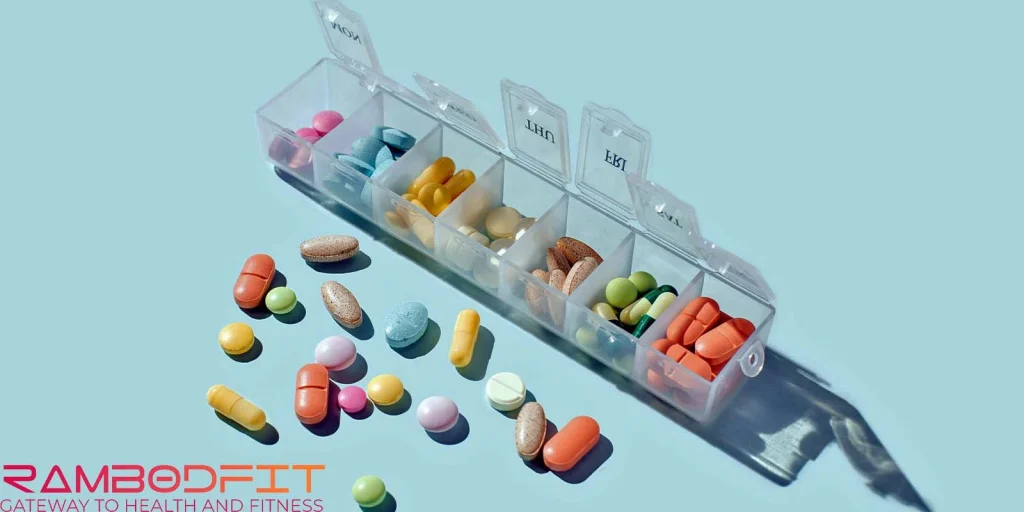


Wellness trends are everywhere these days, and supplements such as vitamins, herbs, and minerals have become part of many people’s daily routines. They may seem risk-free with labels claiming they’re “natural.” The reality, however, is not so simple if you’re also using medication. There are some supplement and medication interactions you should know.
Mixing supplements with medications happens more often—and can be more dangerous—than many people think.
These combinations may change how drugs are broken down in the body, interfere with how they are absorbed, weaken or strengthen their effects, or even cause harmful side effects. Common supplements like vitamin K, iron, magnesium, and omega-3 fatty acids can create problems if taken with certain medicines.
This piece on Rambodfit looks at why these interactions happen, which pairings to watch out for, and how to protect your health in a world where supplements are everywhere.
Table of Contents

To figure out why supplement and medication interactions happen, you have to understand some basics of how drugs work. Most of these supplement and medication interactions stem from a few key ways the body processes drugs, such as:
CYP450 Enzyme Disruption
The cytochrome P450 (CYP450) enzymes found in the liver and small intestine play a big role in breaking down over 70% of the drugs we consume. You can think of these enzymes as the body’s cleanup crew. They handle everything from processing drugs to breaking down caffeine, alcohol, hormones, and harmful substances.
Herbal supplements and vitamins can mess with how this system functions. Products like St. John’s Wort, grapefruit extract, or large doses of vitamins A, C, or E can either speed up or slow down these enzymes. When this happens, problems can arise:
Drugs might stop working well if broken down too fast.
If metabolism slows, toxins could build up in the body.
Absorption issues in the digestive system are also worth mentioning.
Some minerals, such as calcium, magnesium, and iron, compete with medications to be absorbed in the digestive system. If you take them at the same time, they can stick to the medicine and lower how much your body gets of the main ingredient.
Changes in pH or electrolyte levels can also play a role. Certain supplements influence the pH of the stomach or shift electrolyte levels like sodium or potassium. This can change how medicine dissolves or functions. This becomes especially important to think about in people with heart or kidney problems.
Some supplements also affect how blood clots.
Certain vitamins like Vitamin K and Vitamin E, along with herbs such as garlic and ginkgo, and fatty acids like omega-3, have an impact on platelet clumping and coagulation. This can result in either too much clotting or excessive bleeding when combined with blood thinners.
How it Works: The body uses Vitamin K to make clotting agents. Warfarin blocks Vitamin K’s role to stop harmful clots from forming.
Interaction: Eating too much Vitamin K, whether through supplements or foods like spinach or kale, makes warfarin less effective. This raises the chance of strokes or blood clots forming.
Clinical Tip: Keep your Vitamin K intake from food consistent. Avoid taking Vitamin K supplements unless your doctor advises it.
2. Magnesium and Antibiotics (Tetracyclines, Fluoroquinolones)
How it works: Magnesium attaches to these antibiotics and creates a solid complex that the body cannot absorb.
What happens: It prevents antibiotics like ciprofloxacin or doxycycline from working properly by reducing their absorption.

Clinical Tip: To avoid this, take magnesium at least 4 to 6 hours before or after these antibiotics.
3. Calcium and Levothyroxine (Thyroid Hormone Replacement)
How it works: Calcium competes with levothyroxine in the gut, which reduces how much of the medicine gets absorbed.
Interaction: Low thyroid hormone levels can result when interactions occur. This leads to tiredness, weight increases, or slow metabolism.
Clinical Tip: Take levothyroxine first thing in the morning without eating. Wait at least 4 hours before using calcium supplements.
Mechanism: Iron sticks to levodopa (used in Parkinson’s treatment) and levothyroxine. This blocks them from being absorbed.
Interaction: The drugs don’t work as well, which can worsen symptoms like shaking or thyroid issues.
Clinical Tip: Take iron a few hours apart from these medications. Keep at least 2 to 3 hours between doses.
How it works: Supplements such as St. John’s Wort, grapefruit, and large amounts of antioxidants may trigger CYP3A4. This enzyme plays a big role in breaking down drugs in your body.
Effect: Antidepressants like SSRIs and SNRIs, or birth control drugs, might not work well because they leave the body too fast.
Advice: Stay away from herbal products not approved by your doctor if you take psychiatric or hormonal treatments.
6. Vitamin E and blood thinners (like Warfarin or Aspirin)
How it works: Taking high doses of Vitamin E might stop platelets from clumping together. This makes the blood thinner and less likely to clot.
Effect: You could bleed more. This could cause issues like internal bleeding in your gut or even your brain.
Clinical Tip: Stick to less than 400 IU of Vitamin E a day if you use blood thinners, and go higher with a doctor’s approval.
7. Potassium with ACE Inhibitors or Spironolactone
How it works: ACE inhibitors and potassium-sparing diuretics such as spironolactone increase potassium in the blood. Adding supplements intensifies this effect.
What happens: It could lead to hyperkalemia, which is dangerous. This condition can cause irregular heartbeats or even sudden heart failure.
Clinical Tip: Avoid taking potassium supplements on your own if you’re using heart or blood pressure medications.
8. Omega-3 Fatty Acids with Anticoagulant Drugs
How it Works: Omega-3s like EPA and DHA can reduce how well platelets work when taken in large amounts.
Warning: Taking more than 3000 mg may increase how much drugs like warfarin or aspirin thin the blood, which could boost bleeding chances.
Advice for Patients: Cut back on fish oil if you take blood thinners. Always tell your doctor how much you use.
Some groups of people have a greater chance of having supplement and drug conflicts because of their health or lifestyle:
They often use fortified foods or take high doses of B12, iron, zinc, or calcium. These can clash with some medicines.
Keeping electrolytes in balance matters a lot for these patients. Even minor changes in potassium, magnesium, or calcium from supplements might turn out to be harmful.
3. Athletes and Biohackers
Many athletes or biohackers combine multiple supplements, such as pre-workouts, creatine, fat burners, and adaptogens. They often neglect to understand how all these stack up with the medications they take.

Supplements can improve health, but they are not without risks. Like prescription drugs, they might disrupt the body’s biochemical systems. Whether they cause issues with CYP450 processing nutrient imbalances, or thin the blood, the outcomes can range from minor to severe.
The takeaway? Tell your doctor or pharmacist about every single thing you take, even over-the-counter supplements. You need advice tailored to you if you’re dealing with a long-term illness using several medications, or fall into a higher-risk category.
The safest option is teamwork to prevent supplement and medication interactions. Your diet supplements and medications should work together, not cause problems for each other.
To learn more:
Most of the time, yes, but it depends on your meds and the specific vitamins. Calcium, iron, and vitamin K are well-known for having an effect on certain medications. Supplement and medication interactions may cause serious problems.
Watch out for things like strange side effects, reduced effectiveness of a medication, or unusual symptoms. If you notice any changes, talk to a healthcare professional right away.
Not always. Many supplements can be both safe and useful if handled the right way. Timing, the correct dose, and guidance from an expert make all the difference and prevent supplement and medication interactions.